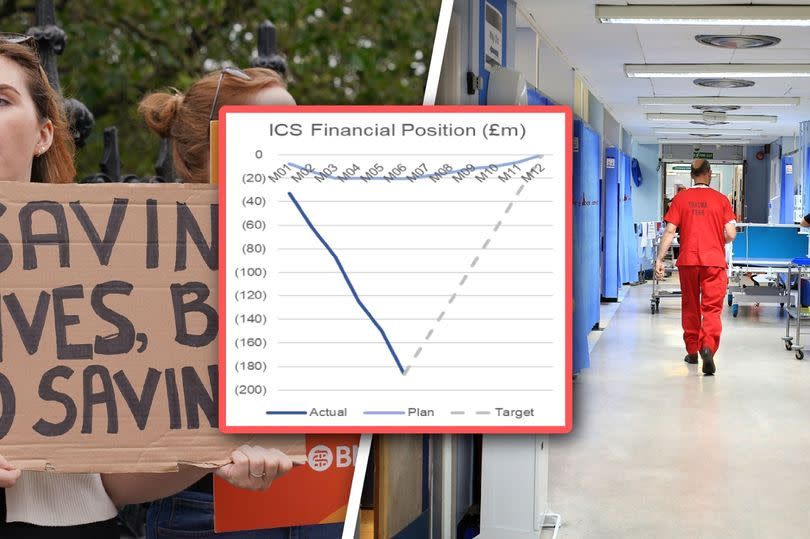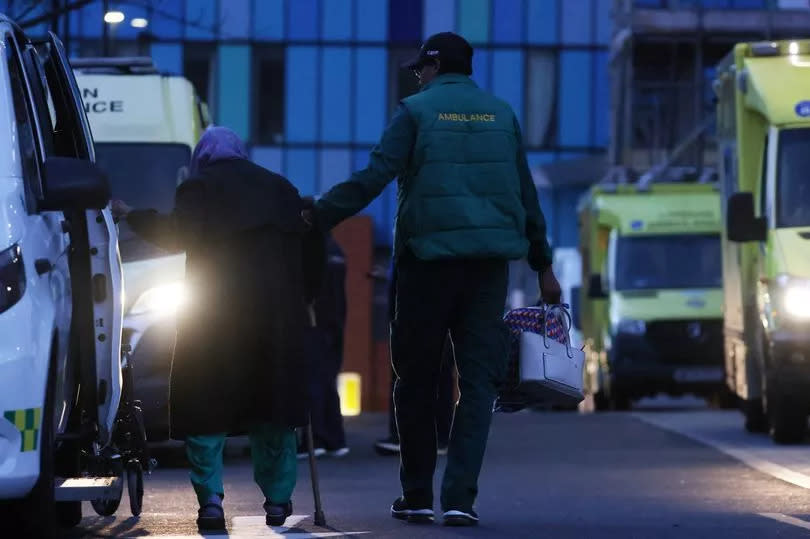Greater Manchester's NHS being plunged into 'special measures' over £180m black hole of debt

Greater Manchester’s NHS is being plunged into a form of ‘special measures’ with NHS bosses stepping in with yet more intervention, the Manchester Evening News can reveal.
Greater Manchester's health and care services, including the region's NHS, have already been forced to massively cut an overspend of £400m over the last year. Accounting consultants were brought in to carry out a ‘financial turnaround programme’ during the first round of intense scrutiny from national NHS bosses. However, the system remains in hundreds of millions of pounds of debt – with a deficit of £180m.
A staff briefing from NHS Greater Manchester, seen by the M.E.N. this morning (April 25), says that it has ‘not yet been able to demonstrate to NHS England (NHSE) that we, as a system, have made the progress required against our well-publicised performance, finance and quality issues’. The city-region’s NHS will now have to go under the next level of scrutiny from its national governor, NHS England, and NHS England's regional leaders.
The M.E.N. understands from a number of sources that these measures are the equivalent of going into a form of special measures for the region’s NHS system, and will likely be coming into force next month. NHS Greater Manchester has told the M.E.N. there are four levels of oversight by NHS England, with Greater Manchester now going into level three, 'meaning NHSE regional team works with us to help us identify what is causing the key areas of concern and, between us, we agree an improvement plan with their support'.
However, NHS Greater Manchester says there is still one higher level of scrutiny could face, which they say replaced the formal special measures programme the NHS used to have. The fourth level is now referred to as the recovery support programme and is used to provide intensive support to failing organisations.
READ MORE: Some of Greater Manchester's hospital trusts are close to running out of cash
NHS Greater Manchester is being put on a ‘system improvement plan’, involving a set of ‘formalised agreed actions’ to be ‘delivered within a specific (yet to be determined) timeframe’.
The staff briefing reads: “NHS Greater Manchester (NHS GM) is still a relatively new organisation which continues to grow in maturity. Despite making good progress in embedding the operational plans which were designed in 2023 with the support of Carnall Farrar and Price Waterhouse Cooper; and despite the incredible hard work and effort that has happened over the last year to reduce our overspend from around £400m to £180m for 2023/24, we enter 2024/25 needing to address the most complex set of challenges that the health and care system in GM has ever faced.”
The region’s integrated care system (ICS) is responsible for paying for, planning and delivering Greater Manchester’s health and care needs, including most NHS services in the area. It is run by an integrated care board.

“Unfortunately, so far, the Integrated Care Board (ICB) has not yet been able to demonstrate to NHS England (NHSE) that we, as a system, have made the progress required against our well-publicised performance, finance and quality issues,” the staff briefing continues. “As a result of this, NHSE has indicated the ICB must work more closely with them to develop a set of formalised agreed actions under one single ‘system improvement plan’ to be delivered within a specific (yet to be determined) timeframe.
“An ICB programme team will be dedicated to delivering this plan, and overseen by a system improvement board (chaired by NHSE’s regional director). This is a process referred to legally as ‘Enforcement Undertakings’ and it is anticipated that this intervention will provide the regional team with a greater level of assurance on our progress.”
NHS England describes 'enforcement undertakings' as a level of enforcement action 'where NHS England has reasonable grounds to suspect a potential failure or is concerned that an ICB is at risk of failing to discharge its function'.

The M.E.N. has previously reported the financial turmoil of NHS Greater Manchester. Late last year, its debt spiralled by more than £800,000 a day in just four months, ending at the £180m deficit figure.
The region’s NHS said the reasons include ‘the ongoing impact of industrial action’ as NHS staff have been on strike for much of the last year, the cost of bank and agency staff needed to fill shortages, and the rising costs of both prescription drugs and ward beds for mental health patients. The regional organisation has been at that level of debt for months – all while trying to pay the regular bills for medical care and drugs being delivered across the 10 boroughs.
Last year, the growing shortfall prompted ‘additional scrutiny’ from NHS England. It was warned that the extra scrutiny could become full-scale intervention if Greater Manchester did not demonstrate ‘fundamental improvements’.
NHSE has placed NHS Greater Manchester into segment three of its standard operating framework, referred to as SOF 3. The framework reads: "For trusts and ICBs in segment three, NHS England and NHS Improvement regional teams will work collaboratively with them to undertake a diagnostic stocktake to identify the key drivers of the concerns that need to be resolved. Through this, we aim to better understand their support needs and agree improvement actions."
There is still one further level of intervention, SOF 4, which NHS England says replaced the previous formalised financial and quality special measures programmes. SOF 4 provides the most intensive support to organisations 'with the toughest challenges'.
What is the Greater Manchester Integrated Care System?
Integrated care systems (ICSs) are partnerships that bring together NHS organisations, local authorities and others to plan services, improve health and reduce inequalities. In Greater Manchester, the ICS provides health and care for a diverse population of approximately 3.1m people across 10 localities and 66 neighbourhoods, according to NHS England.
The ICSs are legally bound to plan and fund most NHS services in the areas they control – including NHS workforce planning. The systems are also required to bring together a broad range of organisations which have an influence on people’s health – including councils, voluntary groups, charities, and a host of NHS staff – to create a strategy to tackle public health and social care in each area.
By bringing all of the resources, planning and delivery under one system, the ICSs are intended to improve and join up health and social care. They became operational in July 2022 under the Health and Care Act, with a specific aim of ‘enhancing productivity and value for money’, according to the King’s Fund – an independent health charity.

The first three months of this last year spelled freefall for the Greater Manchester Integrated Care System – the body responsible for buying, planning and completing most of the region’s health and care services, including those provided by the NHS. The system expected to have a deficit of £20m by July 2023, a year on from the establishment of the mammoth organisation.
That deficit grew to £86.5m by August 2023, but by the sixth month of the financial year, the deficit stood at £186.5m in debt. Weeks away from the end of the financial year, Greater Manchester NHS reported a deficit of £179.9m, as it struggled to keep the debt under the £180m figure – a ceiling set by NHS England.

 Yahoo News
Yahoo News 
